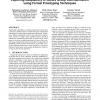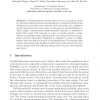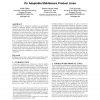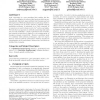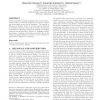111
Voted
MIDDLEWARE
2004
Springer
15 years 8 months ago
2004
Springer
Traditionally, adaptability in communication frameworks has been restricted to predefined choices without taking into consideration tradeoffs between them and the application req...
148
Voted
MIDDLEWARE
2004
Springer
15 years 8 months ago
2004
Springer
The terms pervasive and ubiquitous computing are used to describe a smart space populated by hundreds of intelligent devices that are embedded in their surroundings. Characteristi...
122
Voted
MIDDLEWARE
2004
Springer
15 years 8 months ago
2004
Springer
In this paper, we survey three generation of reflective middleware research carried out at Lancaster University, present experiences gained from this research, and highlight a num...
147
Voted
MIDDLEWARE
2004
Springer
15 years 8 months ago
2004
Springer
Publish/Subscribe systems have become a prevalent model for delivering data from producers (publishers) to consumers (subscribers) distributed across wide-area networks while decou...
99
Voted
MIDDLEWARE
2004
Springer
15 years 8 months ago
2004
Springer
Reuse is an important topic in software engineering as it promises advantages like faster time-to-market and cost reduction. Reuse s on an abstract level is more beneficial than o...
117
Voted
MIDDLEWARE
2004
Springer
15 years 8 months ago
2004
Springer
In order for middleware systems to be adaptive, their properties and services need to support a wide variety of application-specific policies. However, application developers and ...
123
Voted
MIDDLEWARE
2004
Springer
15 years 8 months ago
2004
Springer
Middleware helps to manage the complexity and heterogeneity inherent in distributed systems. Traditional middleware has a monolithic architecture, which makes it difficult to adap...
128
Voted
MIDDLEWARE
2004
Springer
15 years 8 months ago
2004
Springer
Grid computing is a new paradigm that enables the distributed coordination of resources and services which are geographically dispersed, span multiple trust domains and are hetero...
152
Voted
MIDDLEWARE
2004
Springer
15 years 8 months ago
2004
Springer
This work presents a detailed analysis of the security requirements for Service Oriented Architecture in mobile computing, still missing in the current literature. The purpose of ...
113
Voted
MIDDLEWARE
2004
Springer
15 years 8 months ago
2004
Springer
The very nature of implementing and evaluating fully distributed algorithms or protocols in application-layer overlay networks involves certain programming tasks that are at best m...
